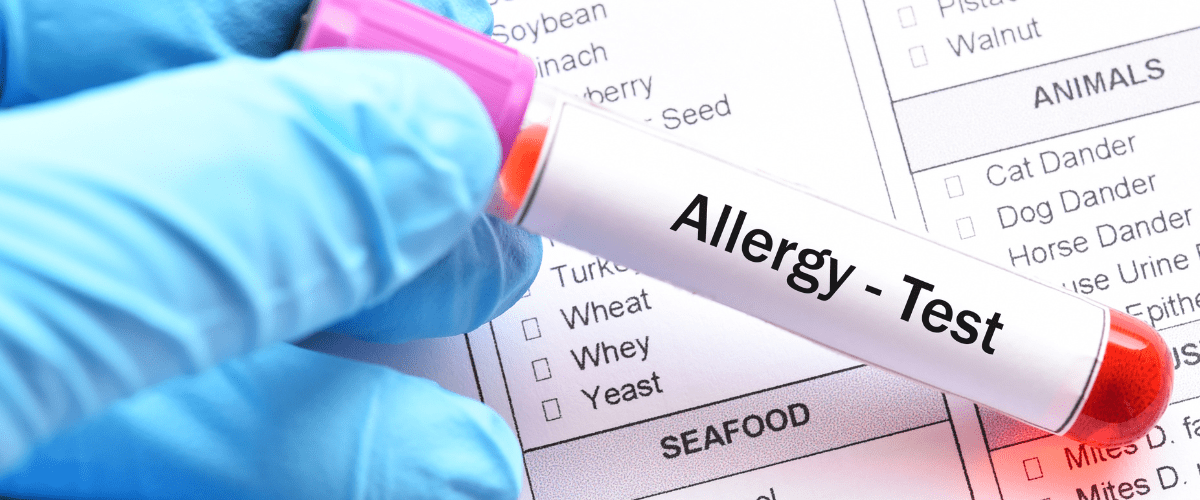Allergy Blood Test

Indications, Process, and Results
Are you wondering whether an allergy blood test can help you find out what’s causing your allergies? If so, then look no further! This blog post will provide an in-depth overview of the indications, process and results of allergy blood tests. An allergy blood test is a great diagnostic tool for those who suffer from severe or persistent allergies as it measures the amount of immunoglobulin – also known as antibodies – present in the bloodstream. With this valuable insight, providers can determine exactly which allergens are triggering your allergic reactions to ensure that your treatment plan is tailored to meet your needs. We’ll go into more detail below on how this amazing medical technology works and why it might be right for you!
An Overview of Allergy Blood Tests
Allergy blood tests, also known as IgE blood tests, are used to determine if an individual has an allergic reaction to a specific substance. These tests are helpful in identifying allergies to food, pollen, pet dander, and other environmental factors. Instead of conducting a skin prick test, blood tests are a convenient way to detect allergies without exposing a person to potential allergens. The blood tests will analyze the levels of immunoglobulin E (IgE) in the bloodstream and provide results that show which allergens the body is reacting to. While allergy blood tests are not always conclusive, they can be an important tool in helping to accurately diagnose allergies and create effective treatment plans for patients. It is important to note that allergy blood tests are conducted at our clinics and interpreted by one of our healthcare professionals.
What Are the Indications for an Allergy Blood Test
An allergy blood test can be a helpful tool in identifying the cause of unexplained symptoms like hives, eczema, or a runny nose. Additionally, this type of test can help identify food allergies and pinpoint specific allergens that cause reactions to occur. If you have a family history of allergies or have experienced sudden and unexplained reactions, it may be worth considering an allergy blood test. Ultimately, your proovider can help you determine if an allergy blood test is a necessary step in identifying the root cause of your reactions.
Allergy Symptoms Include
– Skin reactions such as hives, rash, or eczema
– Digestive issues such as nausea, vomiting, and diarrhea
– Respiratory symptoms like wheezing, coughing, and shortness of breath
– A runny nose or itchy eyes
How Is the Allergy Blood Test Processed and Analyzed
When it comes to diagnosing allergies, blood testing has become an increasingly popular and effective method. But how exactly does the allergy blood test work? After drawing a blood sample, it is sent to a laboratory where it undergoes a process called “ImmunoCAP”. This process looks for specific allergy antibodies in your blood which can help pinpoint any allergens causing a reaction. The results are then analyzed by a specialist who will interpret the data and provide a diagnosis based on the findings. The allergy blood test is a relatively quick and simple procedure but it can provide crucial information for those suffering from allergies. Knowing what allergens to avoid is essential for managing symptoms and improving your quality of life.
What Do Allergy Blood Test Results Mean
If you’ve recently undergone an allergy blood test, you may be wondering what the results mean. Allergy blood test results measure the amount of allergen-specific antibodies in your blood. These antibodies are produced as a response to allergens, such as pollen or pet dander, that your immune system recognizes as harmful. A high level of these antibodies indicates that you have an allergy to that particular allergen. A low level of antibodies means you are less likely to have an allergic reaction to the allergen tested. It’s important to note that positive allergy test results do not always mean you will experience allergy symptoms, and negative test results do not necessarily mean you are allergy-free. Our providers will use these results, along with your medical history and physical examination, to diagnose and manage your allergies.
Allergy blood tests are an effective way to identify the sources of your allergies and can help you manage them better. Knowing the indications for allergy blood testing and understanding how it’s processed and analyzed is essential in order to interpret the results accurately. Additionally, talking to a Health Xpress Provider can help you modify your diet and lifestyle in order to reduce symptoms related to food and environmental allergies. Allergy blood tests provide an excellent opportunity for you to better understand your allergies, develop an individualized management plan and gain greater control over your health.
Schedule An Allergy Blood Test Today
Heath Xpress Medical Center offers allergy blood testing services to help you better understand and manage your allergies. We are dedicated to providing the highest quality of care, schedule an appointment today! Our providers will work with you to determine what type of test is best for your needs and provide strategies for managing any existing allergies.


